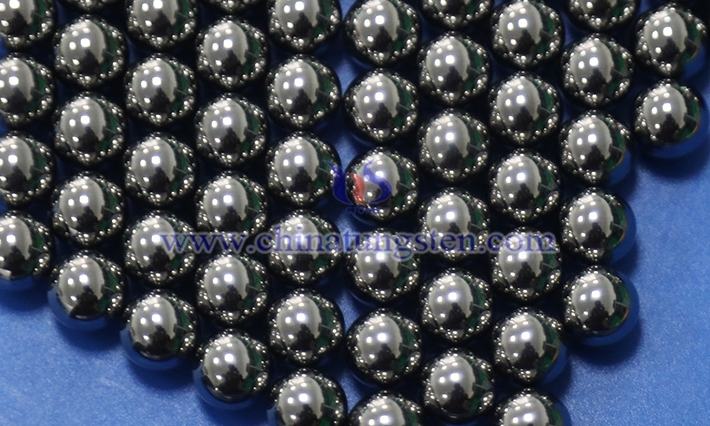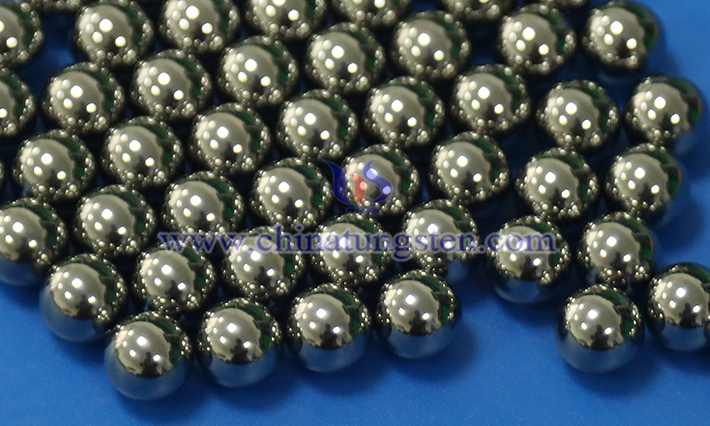Characteristics of Tungsten Cemented Carbide Balls
- Details
- Category: Tungsten Information
- Published on Wednesday, 10 September 2025 17:27
Tungsten cemented carbide balls, due to their outstanding performance, are widely used in industrial applications such as precision bearings, valves, abrasive media, and metering instruments. Their high hardness and wear resistance make them outstanding in harsh environments.
The basic characteristics of tungsten cemented carbide balls are as follows:

1. High Hardness: Tungsten cemented carbide balls are primarily composed of tungsten carbide (WC) and a binder such as cobalt (Co). Their hardness typically ranges from HRA 85-93 (close to diamond), making them highly resistant to scratches and deformation.
2. Excellent Wear Resistance: Thanks to their high hardness and dense microstructure, tungsten cemented carbide balls exhibit exceptional durability in high-friction and wear environments.
3. High Compressive Strength: Tungsten cemented carbide balls have a compressive strength exceeding 6000 MPa, allowing them to withstand extreme pressure without breaking or deforming. 4. Good Toughness: By optimizing the cobalt content, tungsten cemented carbide balls maintain high hardness while maintaining a certain degree of toughness, making them resistant to shock and vibration.
5. Corrosion Resistance: Tungsten cemented carbide balls exhibit excellent corrosion resistance to a variety of chemicals (such as acids, alkalis, and saline solutions), making them suitable for harsh chemical environments.

6. High Density: Tungsten cemented carbide balls typically have a density between 14.5-15.0 g/cm³, providing high inertia and stability, making them suitable for applications requiring mass concentration.
7. Thermal Stability: Tungsten cemented carbide balls maintain their mechanical properties at high temperatures (up to 800°C or above, depending on their composition), making them suitable for high-temperature applications.
8. Low Coefficient of Thermal Expansion: Tungsten cemented carbide balls have a low coefficient of thermal expansion (approximately 4.5-6.0 × 10⁻⁶/°C), resulting in excellent dimensional stability and suitable for high-precision and high-temperature differential environments. 9. High Surface Finish: Tungsten cemented carbide balls can be machined to extremely high precision (e.g., G3 and G5 grades), with low surface roughness and a low coefficient of friction, making them suitable for precision fits.
10. Fatigue Resistance: Tungsten cemented carbide balls exhibit excellent fatigue resistance under cyclic loading, extending their service life.
11. Electrical Conductivity: Tungsten cemented carbide balls exhibit a certain degree of electrical conductivity, making them suitable for applications requiring electrical conductivity or anti-static properties.
12. Adjustable Magnetic Properties: Depending on the cobalt content, tungsten cemented carbide balls can be either weakly magnetic or non-magnetic to meet specific application requirements.
- Chinatungsten Online: tungsten-carbide.com.cn
- CTIA GROUP LTD: en.ctia.group
- Tungsten News & Price: www.ctia.com.cn
- Molybdenum News & Price: news.molybdenum.com.cn
- Tel.: 86 592 5129696; Email: sales@chinatungsten.com



 sales@chinatungsten.com
sales@chinatungsten.com